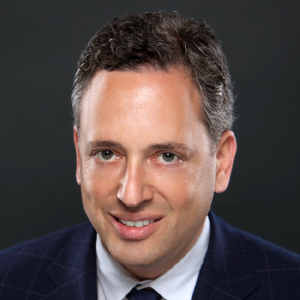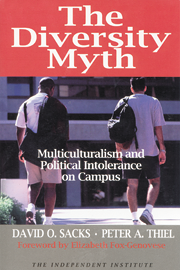October 13. 1995
President Casper:
How can we increase diversity on campus? This is a pressing question for all those who wish to maintain a cosmopolitan sensibility and, more importantly, a robust marketplace of ideas. After all, a university is not diverse if people merely look different but think alike.
In The Diversity Myth, based upon years of careful research and our first-hand experience as Stanford students for a combined total of 11 years, we detail precisely bow many of Stanford’s muliticultural policies have undermined diversity, squelched dissent, and narrowed intellectual life. To take but a few examples:
- By slashing its foreign language departments, Stanford has limited the study of other cultures. Over the last decade.the deparunents of French and ltalian, German, Spanish and Portuguese, and Slavic languages have lost a combined eight billets for tenured-track faculty—a cut of about 20 percent. An adminisuarive merger between the French, Italian, Spanish, and Portuguese departments also decrased support staff for languages.
- A perverse result of affirmative action hiring policies seems to be a lack of intellectual diversity among humanities faculty. To take but one indicator, more than 80% of the humanities faculty are Democrats. Departments like Feminist Studies and African-American Studies have no Republicans at all.
- The primary effect of racial theme dorms has been to remove a large number of minority students form the rest of the university. and thereby to limit diversity of interaction. This has balkanized the campus into distrustful ethnic factions. The problem has been exacerbated by separate orientation activities, separate graduation ceremonies. and separate university-sponsored events.
- The high cost of multiculturalism has precipitated large tuition increases and as a result, has limited socioeconomic diversity. Stanford is now far less accessible to students of middle-class backgrounds.
Not everyone would agree with all of these claims. but as the leader of a campus that prides itself on its open-mindedness, we thought you have at least sought to promote a constructive debate. But instead you have engaged in pettiness and name-calling. ln a recent letter to The Wall Street Joumal, you charged us with “demagoguery,” “concoct[ingl a cartoon,” and making “egregious errors and misrepresentations.” Even a cursory reading of The Diversity Myth, however, puts the lie to your reflexive denunciations:
(l) You claim that Stanford did “not slash its foreign language departments.” As we have already detailed, this is false. According to university ofiicial John Etchemendy, “cuts were not across the board. They were targeted. ln the case of humanities, they were focused on the languages.” Our source is none other than the front page of The Stanford Daily, May 24. 1994: “Concern mounting over loss of billets;” see also The Diversity Myth, p. 46.
(2) You claim that “no freshman students fill our grant requests for tbeir professors’ favorite community service agendes.” Again. this is demonstrably false. In her Fall l99l Freshman English class. to take but one example, Professor Susan Wyle handed out a list of preferred groups for which students could do “community service writing,” including “grant requests:” the Hunger and Homeless Action Committee of San Mateo County, a self-described “advocacy” group: the Homeless Agency Project of the Bar Association of San Francisco: Ellipse Peninsula AIDS service; Bay Area Actio, which “works locally to achieve the Earth day ‘Agenda for the Green decade’,” Mid-Peninsula Citizens for fair Housing which exists “to gather evidence of illegal discritrtination” and The Environmental Protection Division of the City of Palo Alto. See The Diversity Myth, pp. 86-87. And if you still do not believe us, we can provide you with the handouts.
(3) You prepostetously claim that “there is neither a requirement in feminist studies nor race theory.” Every student knows that this is demonstrably false. We refer you to the Stanford University Bulletin 1995-1996 which requires at least one class “certified as concentrating on gender studies” and one course on “American Cultures.” defined as the study of “systematically discriminated” ethnic groups. See also The Diversity Myth, p, 68.
We could list many other “egrerious errors and nisreprescntations” that you have made in characterzing our position. But it is worth pointing out that your somewhat hysterical reaction does lend credence to one of our central concems—namely, that it has become very difficult to have a rational and intelligent conversation about multiculturalism on campus. Those who question the fundamental assumptions of what former President Donald Kennedy described as Stanford’s “great multicultural experiment” are called names and tend to be dismissed out of hand.
You claim to be “fully committed to the open exchange of ideas.” So are we. To date, neither you nor Provost Condoleezza Rice has responded to our invitation for a public and open debate—anytime and anywhere—on any and all facets of Stanford’s multicultural experiment. But we remain open to engaging in a public dialogue on these topics. although we would prefer to do so without the name-calling.
Finally, you note that Stanford has “raised standards and requirements.” We acknowledge that there has been some progress since the disastrous Kennedy years and it has not escaped our attention that some grading policies have been toughened (see The Diversity Myth, p. 222). But much more needs to be done. For starters, we would support the elimination of “orchid subjects” which look nice but serve no purpose; make deep cuts in the university’s services and simultaneous cuts in tuition; make available the option of a three-year degree; and prohibit professors and administrators, including the President, from taking political stands. These are all useful reforms that you suggested at the beginning of your tenure, but have since backed away from. lt sadly appears that you, too, have been co-opted by the politics of intolerance on campus.
Or perhaps it is simply that you have not had time to push these matters. We understand that your job requires you to travel around the country and raise money from concemed alumni. And we acknowledge that our frank and open discussion of multiculturalism may only further complicate matters for you. Nevertheless, if this is the case, we would suggest that your priorities have been misplaced. Over the long term, it would be more constructive for you to devote your energies towards solving Stanford’s problems, rather than towards denying that these problems exist. Instead of attacking the messengers, the University might do well, just for once, to heed their message.








